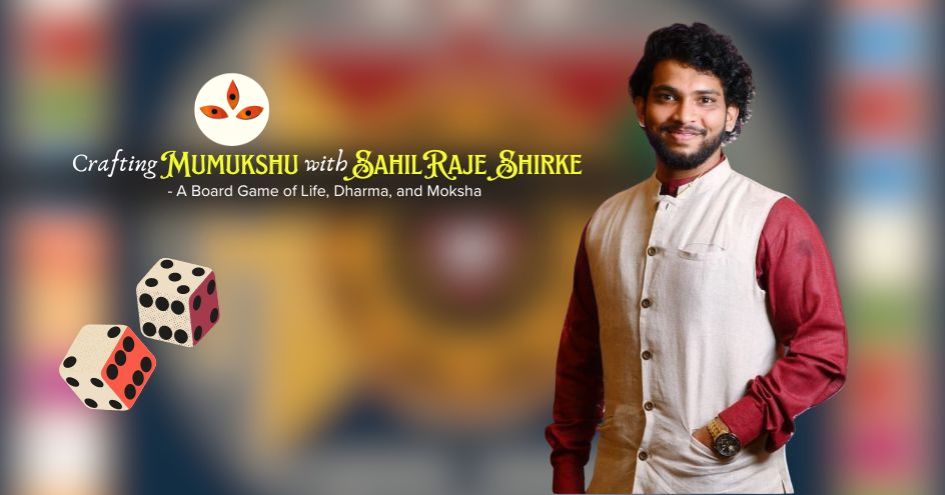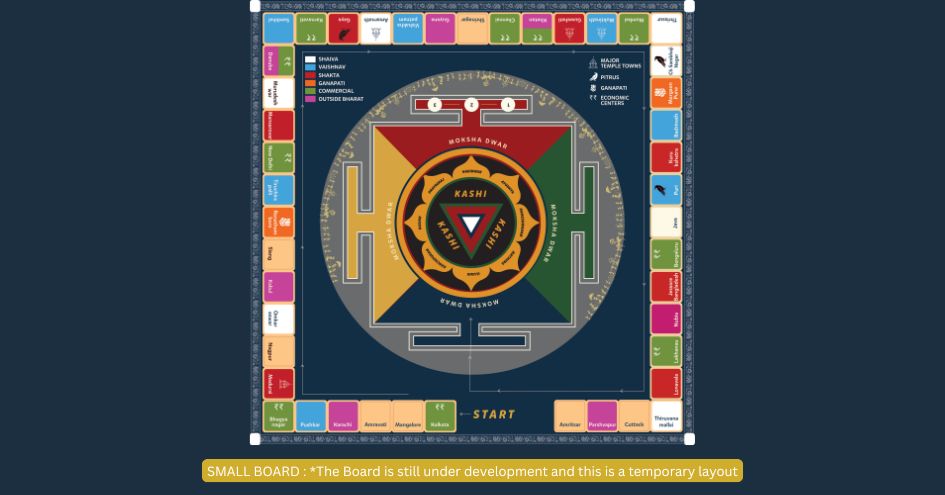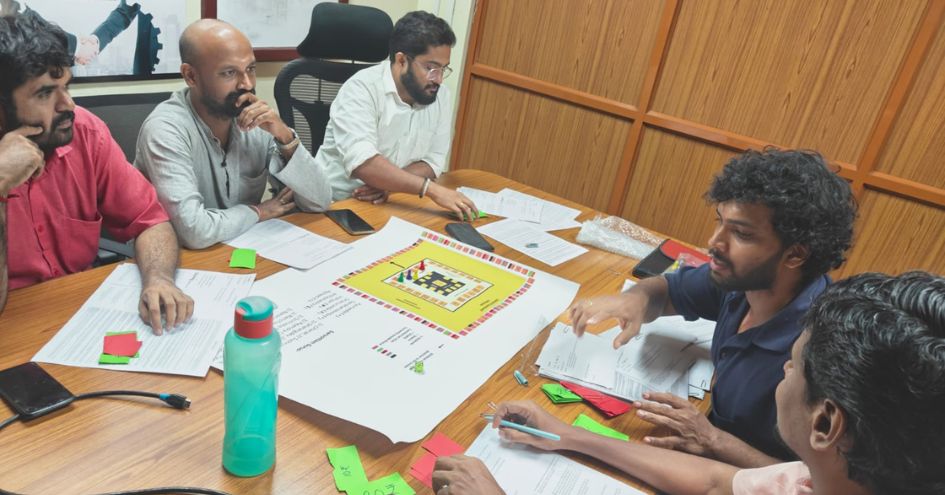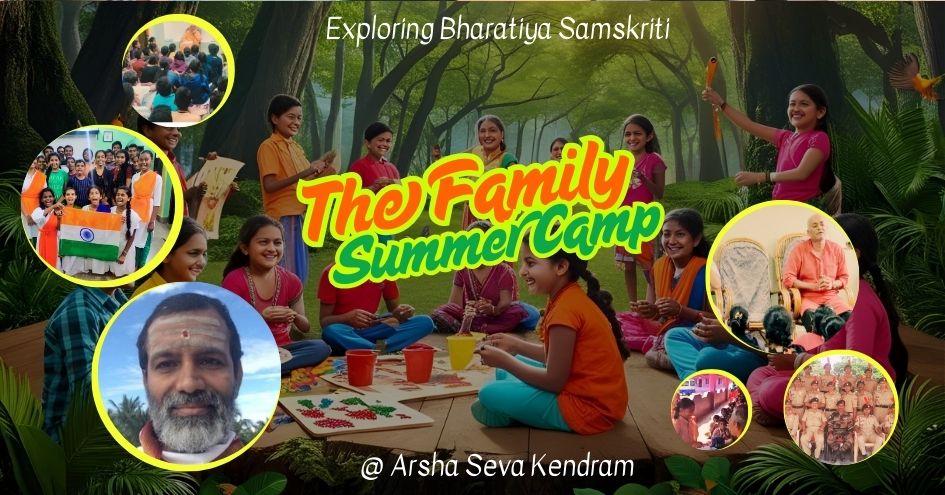
2nd May, 2025
In a world increasingly dominated by fleeting digital entertainment, SahilRaje Shirke, an entrepreneur with a deep-rooted passion for India's vast history, geopolitics, and spiritual traditions, embarks on a unique quest: to reintroduce ancient wisdom through the engaging medium of a board game. Is it just for kids? Let’s find out.
"Mumukshu," his creation, is more than just a game for children; it's a carefully crafted narrative experience, a journey through the Hindu way of life, aiming to balance the four Purusharthas – Dharma, Artha, Kama, and ultimately, Moksha.
SahilRaje Shirke, who has represented India at the BRICS summit of Young leaders & entrepreneurs and is deeply involved in social ventures like 'Subhikshaa' and 'Bharatam Reawakening', brings a multifaceted perspective to game design. His background includes founding a tech startup and serving as COO for another, alongside a continuous study of Vedanta. This blend of modern enterprise and ancient knowledge forms the bedrock of Mumukshu.
Mumukshu essentially means someone who is seeking Moksha. This core concept drives Mumukshu: "Every player in Mumukshu is a seeker who races towards Moksha - the freedom from the eternal cycle of life, death, and rebirth."
A Game That Mirrors Life
Mumukshu is designed to be a "life simulation game based on Indian civilisation, culture & way of life". Players don't just move pieces on a board; they navigate the complexities of life, making choices that have tangible consequences within the game's framework. The ultimate goal is Moksha, but as Sahil elaborates, this pursuit is not about renouncing the world prematurely. "It is about balancing them [the Purusharthas] to attain Moksha, but while accomplishing your aarthic and kamic objectives in a dharmic fashion."
Interestingly, the protagonist in Mumukshu is not a king or a sage, but a common individual. Sahil’s reasoning is profound: "I believe every common man has that potential to achieve great things. However, they have to go through that journey, much like gold has to go through extreme heat and is beaten to become the valuable asset we see. Mumukshu is a small preparation to make this journey easier by introducing them to the ancient knowledge that Bharat has.”
Players explore a beautifully rendered Bharat Varsha, journeying through its diverse cultures, learning about its heroes, and its glorious, often understated, history. The game features locations like Kashi and Prayagraj, but also extends to places historically part of Greater India (Akanda Bharat) or bearing significant Hindu cultural influence, such as Khotan (modern-day Xinjiang) and even Aleppo in Syria. "All these places mentioned in the game, they have a Massive Hindu cultural influence, it's just that we aren't aware, as we all know, our education system didn't allow us to know about all these things," Sahil notes, emphasising the game's historically accurate underpinnings.

Gameplay: Strategy, Spirituality, and the Dance of Maya
Inspired by the strategic depth of Chess, a game Sahil played competitively in his childhood, Mumukshu demands thought and planning. "It shouldn't be a timepass game," he asserts. Players manage two critical resources: money and grace points. Sahil emphasises the practical wisdom embedded here, quoting an age-old principle, "As Kautilya said, 'Dharmasya moolam artha,' meaning the root of Dharma is in Artha (economic well-being). Money is earned through professions in the game to fulfil life objectives, while grace points represent divine favour. These grace points allow players to take extra actions, manipulate dice rolls, and even unlock "Siddhis" – superpowers granted by their chosen Ishta Devata (favourite deity).
But the path isn't straightforward. "Maya," or illusion, plays a tricky role, distracting players from their goals, much like in real life. "Mumukshu is also about this management of resources planning for this unforeseen circumstance, which Maya brings forth," Sahil says, highlighting how the game trains players holistically for life.
The game unfolds through life's different Ashrams (phases), starting from Brahmacharya (student life) and focusing significantly on Grihastha Ashram (household life), where much of the strategic gameplay occurs, before moving towards Vanaprastashram & Sanyasashram (renunciation). Mandatory objectives, such as marriage and paying homage to ancestors (Pitrus), are woven into the gameplay, serving as subtle reminders of important cultural and dharmic duties often forgotten in modern life. Another unique objective involves searching for ancestral roots and establishing a Kuladevi (clan deity) temple, prompting players to connect with their heritage.

Game Versions and Player Dynamics
To cater to different preferences and time commitments, Mumukshu will be available in two versions. "There's a smaller board, which offers a condensed experience with a gameplay duration of about 1 to 2 hours," Sahil mentions. "For those seeking a deeper immersion, the large board version can take upto 3 hours to complete." While the game could technically accommodate more, he explains, "Considering the strategic thinking involved and the time each player might take, we've found it's best experienced with 2 to 4 players to ensure a smooth and engaging flow." A minimum of two players is required due to its competitive and interactive nature.
More Than Just a Game: A Tool for Connection and Cultural Reawakening
Sahil shares that Mumukshu has resonated deeply with play-testers across various age groups. For children (ideally 13+, though younger children can play with guidance), it begins as fun but leaves a "very deep impact" by subconsciously registering civilizational and cultural knowledge. Young adults find it offers a "very unique perspective to contemplate and think about" life's challenges and responsibilities. Older players, those above 40-45, "could relate with every aspect of the game".
One of the most heartening pieces of feedback for Sahil has been how Mumukshu fosters family bonding. "A parent told me that the game helped them bond with their child, know how they view life & their thinking process." he recounts.
The spark for Mumukshu came from a realisation that lectures and discussions on history and culture often had a limited and temporary impact. Sahil pondered, "How can we create a more lasting impact?". He drew inspiration from traditional Indian forms of entertainment, which were always intertwined with spiritual elevation, and the enduring game of Snakes and Ladders, which originally represented the interplay of good deeds (ladders) and vices (snakes – Shat Ripus like Kama, Krodha). "That's how the subconscious of a child is influenced by the play," he reflects.
Sahil envisions Mumukshu as a "dharmic source of entertainment" that can offer a meaningful alternative to much of today's media consumption, which he feels is "not very helpful or just productive". "The idea behind the game is to make it as fun, interesting and enjoyable as possible, and all this [knowledge and values] comes through the back door," he emphasises.

The Path Ahead for Mumukshu
Currently in its final testing stages, Mumukshu is slated for launch around July 2025. Initially, it will be available directly through Sahil's website or WhatsApp to ensure quality and avoid counterfeit products. Sahil also has plans for a digital version and an accompanying trivia book to expand on the cultural and historical elements within the game.
The creation of Mumukshu has been a deeply personal and spiritual journey for Sahil. "I genuinely feel that from the bottom of my heart, that this game is not just because of me, it is genuinely an inspiration from Ma [the Divine Mother]," he shares, recounting instances where he felt divinely guided through creative challenges. He also gratefully acknowledges his collaborators: Akshaya Patil for the game's beautiful artwork, Saket Agrawal for assistance with legal aspects, and Malvika Shetty for her testing support. He also expressed his heartfelt gratitude to his family for fostering a supportive environment that allowed him to deeply explore and cultivate his understanding of ancient Indian knowledge.
Sahil hopes Mumukshu will reach the masses, even envisioning it as "the new Snakes and Ladders" – a game that not only entertains but also elevates thinking and strategic capacity. He believes it holds immense potential for promoting tourism and culture, suggesting collaborations with ministries of culture, education, and tourism. "Beyond homes, Mumukshu can be a valuable tool in schools to make learning about heritage interactive, and even in corporate offices for team-building exercises that also touch upon ethical decision-making and strategic planning through a unique cultural lens," he states passionately. "This is the best way to promote our culture."
For those who wish to contribute or be part of Team Mumukshu, opportunities exist, including interning for the Mumukshu Trivia book. Sahil welcomes contact via his WhatsApp number for collaborations or inquiries mentioned below.
Mumukshu is more than an entrepreneurial venture; it's SahilRaje Shirke's offering—an attempt to package profound life lessons from Indian traditions into a form that is accessible and engaging. While the game is designed to educate and imbue a deeper understanding of a profound way of life, Sahil and his team have meticulously ensured that, at its heart, Mumukshu remains an inherently fun experience for everyone who plays it. As players roll the dice and navigate their path on the board, they are invited to reflect on their own lives, their duties, their desires, and their ultimate quest for meaning – all while having fun along the way. After all, what is life without fun?
For internship, contributions, and collaborations, contact -
SahilRaje Shirke - 93266 43061, 99695 20015
 Vigneshwaran, Senior Correspondent of TheVerandahClub.com is both a skilled digital content writer, story teller and marketer by profession, as well as an avid independent writer driven by his passion. His literary talents extend to crafting beautiful poems and captivating short stories including the Sehwag Tales series. In addition to these creative pursuits, he has also authored a book titled "Halahala," which can be found on Wattpad.
Vigneshwaran, Senior Correspondent of TheVerandahClub.com is both a skilled digital content writer, story teller and marketer by profession, as well as an avid independent writer driven by his passion. His literary talents extend to crafting beautiful poems and captivating short stories including the Sehwag Tales series. In addition to these creative pursuits, he has also authored a book titled "Halahala," which can be found on Wattpad.
PREVIOUS ARTICLE
NEXT ARTICLE

Indian parents today are increasingly concerned about their children's limited exposure to the country's rich culture, heritage, and history. Recogniz...